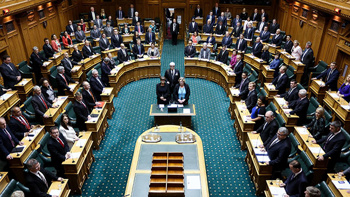Hundreds of thousands of the poorest Kiwi families will get a small income boost next April, with the Government makes some light tweaks to the Family Tax Credit, the main Working for Families tax credit.
The Family Tax Credit rate will increase from $136 to $144 per week after tax for the eldest child, and from $111 to $117 per week for a subsequent child. The Best Start tax credit rate increases from $69 to $73 weekly after tax. More than 300,000 families receive Working for Families tax credits, most of them receive the Family Tax Credit, which goes to families on a benefit as well as working families.
The increase is required by law whenever inflation is above 5 per cent. National did not say when it would deliver its $25 a week In-Work Tax Credit (IWTC) boost promised at the election, although hinted that it would come in Prefu. The IWTC change is meant to trigger next July, three months later than it was promised on the campaign trail.
Prime Minister Christopher Luxon and Finance Minister Nicola Willis made the announcement as they accused the former Labour Government and its Finance Minister Grant Robertson of leaving a cupboard full of fiscal surprises for the new Government, worth “billions” of dollars.
Willis promised to give more information when she delivers her mini-Budget alongside Treasury’s Halfy-Year Economic and Fiscal Update, which she announced would be December 20 - right before Parliament breaks for Christmas.
Governments are not able to keep many fiscal secrets from the public. The powerful Public Finance Act (PFA) forces them to open the books twice a year, publishing detailed accounts and forecasts of the Government’s financial position and a comprehensive list of things that could undermine it.
Willis accused Robertson of following the “letter” of the act, but not the “spirit” of the PFA through leaning on time-limited funding.
She argued that Treasury’s Pre-election Economic and Fiscal Update did not capture the full picture of the fiscal pressures faced by the Government for two key reasons. The first, is that Treasury’s list of “risks” - a laundry list of potentially costly problems that could blight the Government’s forecasts - does not adequately capture the challenges faced by the new Government.
Most of these risks do not have dollar figures attached to them, meaning the Opposition is unable to get a clear picture of how heavily they weigh on the books until they’re in government. The reason for this is that the risks are often difficult to confidently cost, or the costs are commercially sensitive.
The current list of risks includes replacing the Interislander ferries, and the Ōtaki to north of Levin road, both of which are widely expected to be running severely over budget.
“The risks.... were referred to in the pre-election update,” Willis acknowledged, “but the true scale and urgency of which was not made clear for a range of reasons including commercial sensitivity. Some of these risks are now upon us and they are much larger than have been suggested,” Willis said.
The bigger allegation is that the Government funded a number of its programmes on a time-limited basis, creating what National is calling “fiscal cliffs”. Things like school lunches, a Pharmac funding increase, and the apprenticeship boost scheme, were all funded on a time-limited basis, rather than being funded in perpetuity.
“I have been surprised by the sheer number of government policy programmes for which funding is due to expire as the Government chose to fund those programmes on a short-term basis,” Willis said.
/cloudfront-ap-southeast-2.images.arcpublishing.com/nzme/YOLHDOU2KFEABJPMOAMCJ2OZGU.jpg) Grant Robertson said the attack was "desperate". Photo / Michael Craig
Grant Robertson said the attack was "desperate". Photo / Michael Craig
She described the practice as “extremely disingenuous”.
“This is because it makes the books look better in future years, even though it is highly unlikely ministers genuinely intended to stop funding those progress,” Willis said.
Willis said early Treasury advice indicated there were “billions” of dollars of programmes funded this way.
The Government is now considering an amendment to the Public Finance Act which put all of these risks “in one place” making them easier to see.
Robertson shot back, calling the attack “desperate” and noting that all the alleged cliffs were readily available in Budget documents. He said the Pharmac cliff was a result of the former Government’s decision to move to multi-year Pharmac funding as part of the new health reforms. Robertson argued this was clearly not a secret because both National and Labour included funding for Pharmac in their pre-election fiscal plans - meaning both parties clocked the change.
“I certainly didn’t invent time-limited funding,” Robertson said.
“We did two years of health funding and now we’re moving into a three-year health funding phase. Both parties acknowledged that, and made the decision that we would spend some of the new operating allowance into the future to fund that,” Robertson said.
He said National’s attack was a “desperate diversion from somebody who can’t make their tax package add up”.
Thomas Coughlan is deputy political editor and covers politics from Parliament. He has worked for the Herald since 2021 and has worked in the Press Gallery since 2018.
Take your Radio, Podcasts and Music with you









